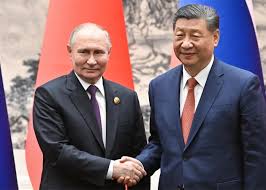China and Russia Seek to Reshape the Global Geopolitical Map: What Are the Measures?
September 4, 2025210 ViewsRead Time: 2 minutes

Font Size:
16
In a move that reflects a deep strategic shift in global energy alliances, China continues to strengthen its partnership with Russia through giant energy projects, challenging American pressures and Western sanctions. These moves are not just transient commercial deals, but a redrawing of the geopolitical energy map of the world.
The "Power of Siberia 2" project for importing Russian gas represents the latest link in the rising cooperation between Beijing and Moscow. This massive project, which will add more than 40 million tons annually of natural gas, will make China the largest importer of Russian gas, thus surpassing the traditional reliance on the European market, which was the main consumer of Russian energy exports before the war in Ukraine.
The geopolitical message here is clear: while the United States continues its efforts to cement its dominance over the global energy market, China chooses to strengthen its alternative alliances.
The timing was not coincidental. China's decision to increase its reliance on Russian energy comes after the Trump administration imposed comprehensive tariffs, and Xi Jinping responded by imposing tariffs on American liquefied natural gas. These moves reflect the rising tension between the two superpowers and its direct impact on global energy markets.
This Chinese-Russian cooperation poses a direct challenge to the American strategy. While Washington seeks to economically isolate Russia, Beijing offers Moscow a vital outlet for its energy exports. Analysts at Bernstein expect that Russian gas will cover 20% of China's needs by the 2030s, compared to 10% currently.
However, this partnership is not without challenges. Russia may have to accept low prices close to Chinese domestic levels, which undermines its economic viability. Additionally, the long timeline for project implementation - expected after 2030 - leaves room for many geopolitical variables.
The most explicit message came from China's import of its first shipment of liquefied natural gas from the sanctioned Arctic 2 project. This step represents a clear test of the Trump administration's will to enforce sanctions and confirms that Beijing will not allow American pressures to dictate its energy choices.
The "Power of Siberia 2" project for importing Russian gas represents the latest link in the rising cooperation between Beijing and Moscow. This massive project, which will add more than 40 million tons annually of natural gas, will make China the largest importer of Russian gas, thus surpassing the traditional reliance on the European market, which was the main consumer of Russian energy exports before the war in Ukraine.
The geopolitical message here is clear: while the United States continues its efforts to cement its dominance over the global energy market, China chooses to strengthen its alternative alliances.
The timing was not coincidental. China's decision to increase its reliance on Russian energy comes after the Trump administration imposed comprehensive tariffs, and Xi Jinping responded by imposing tariffs on American liquefied natural gas. These moves reflect the rising tension between the two superpowers and its direct impact on global energy markets.
This Chinese-Russian cooperation poses a direct challenge to the American strategy. While Washington seeks to economically isolate Russia, Beijing offers Moscow a vital outlet for its energy exports. Analysts at Bernstein expect that Russian gas will cover 20% of China's needs by the 2030s, compared to 10% currently.
However, this partnership is not without challenges. Russia may have to accept low prices close to Chinese domestic levels, which undermines its economic viability. Additionally, the long timeline for project implementation - expected after 2030 - leaves room for many geopolitical variables.
The most explicit message came from China's import of its first shipment of liquefied natural gas from the sanctioned Arctic 2 project. This step represents a clear test of the Trump administration's will to enforce sanctions and confirms that Beijing will not allow American pressures to dictate its energy choices.